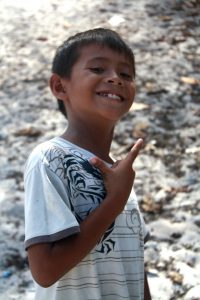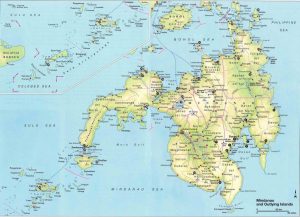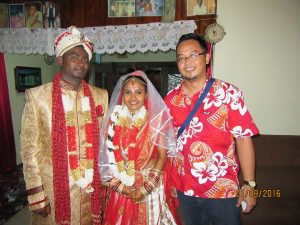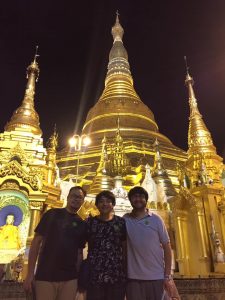POYONG, THE LITTLE PRINCE
Kurt Zion, Columban Father, Philippines
“Mamiss kita kuya!” (I will miss you big brother!), Poyong said while I sipped my last cup of coffee on the island. During that entire week, I got to know him and his friends. On the first day on the island, a medical mission was being conducted which included free circumcision operation for boys. He bravely volunteered to be circumcised and so we accompanied him.
I had been living on the island for almost a week as part of the Silsilah Summer Course on Muslim-Christian Dialogue in Zamboanga City, where young Muslims and Christians come and live together for about a month. After the course I decided to spend a week on the island of Great Sta. Cruz.
The first occupants of the island were Tausugs who left Jolo to escape the war and fighting during martial law days. Now there are about 87 registered families and a total population of about 400 people on the island. I was adopted into the family of Isnira (Ka Indah) and Hanapi Kasan, a couple with their two sons, Firsaud and Rashid. The family lives with the parents of Ka Indah, Inah Amina and Amma Ali. The family also looks after Poyong and his sister Jamila, who are the children of Ka Indah’s sister.
One evening, I found Ama Ali praying inside the house. After his prayers, he told me that as a young man, he decided to focus his life to Allah and perform the “ibadat” which includes doing the “lima waqto” or praying five times a day. After he was done praying, I got a chance to ask him if I go with him to catch crabs and he told me I could. On that night we spoke about life on the island. Amma Ali observed that things have changed, men don’t have time any more to pray but just work and work because life is getting harder and harder on the island. I asked him about a rosary-like thing I saw him carrying one time. He stood up and after some time came back and showed it to me. Then he gave me one of them. The rosary–like thing I referred to was the “tasbih” which they use in reciting the glories/names of Allah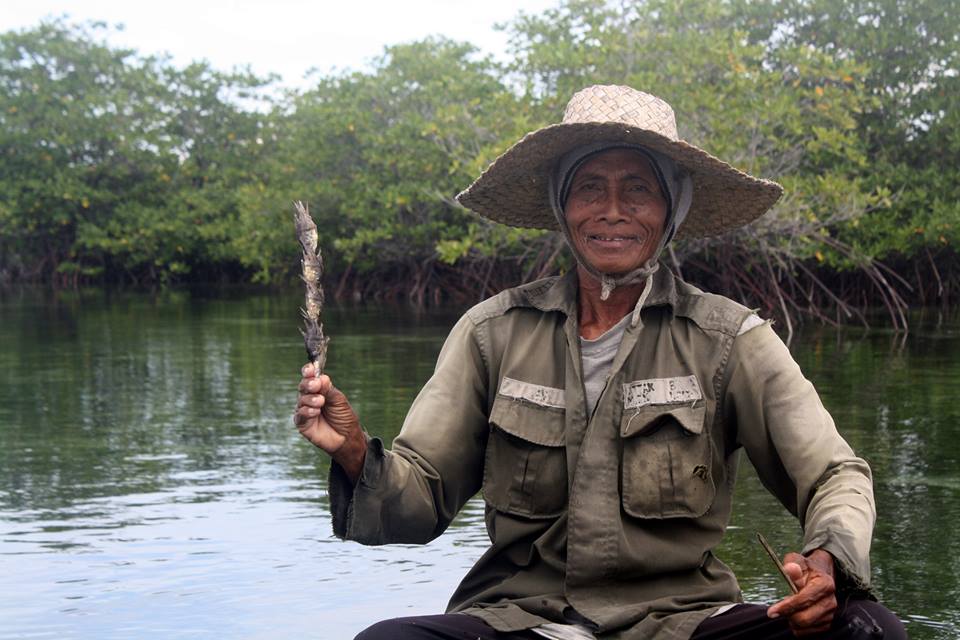 Amma Ali and I finally went out to catch some crabs the next morning. We sat on the boat and slowly paddled out into the sea. Amma Ali uses a crab trap called “panggal” and he has about 10 of them. We went into lagoon. He dropped the traps as we went deeper into the lagoon. When he was done, he exclaimed, “Allahu Akbar!” (God is great!) then we went on shore to the place were he takes his rest. I noticed there were newly planted mangrove shoots near the shore and so I asked him about them. He told me that he used to cut a lot of mangrove trees for firewood and other things and so in order to replaced what he took from the mangrove forest, he has been planting mangrove trees. Most of the other trees he planted like guavas, lemon and papaya were dying out because of the dry weather. After about an hour, he decided we return to check the traps. He picked up all the traps and only 3 crabs were caught but still he said, “Alhamdullilah!” (Praise be to God!) He added that these days he has been getting less and less, smaller and smaller crabs. He considers the pollution and over harvesting of crabs to be the reason why there are lesser and smaller crabs.
Amma Ali and I finally went out to catch some crabs the next morning. We sat on the boat and slowly paddled out into the sea. Amma Ali uses a crab trap called “panggal” and he has about 10 of them. We went into lagoon. He dropped the traps as we went deeper into the lagoon. When he was done, he exclaimed, “Allahu Akbar!” (God is great!) then we went on shore to the place were he takes his rest. I noticed there were newly planted mangrove shoots near the shore and so I asked him about them. He told me that he used to cut a lot of mangrove trees for firewood and other things and so in order to replaced what he took from the mangrove forest, he has been planting mangrove trees. Most of the other trees he planted like guavas, lemon and papaya were dying out because of the dry weather. After about an hour, he decided we return to check the traps. He picked up all the traps and only 3 crabs were caught but still he said, “Alhamdullilah!” (Praise be to God!) He added that these days he has been getting less and less, smaller and smaller crabs. He considers the pollution and over harvesting of crabs to be the reason why there are lesser and smaller crabs.
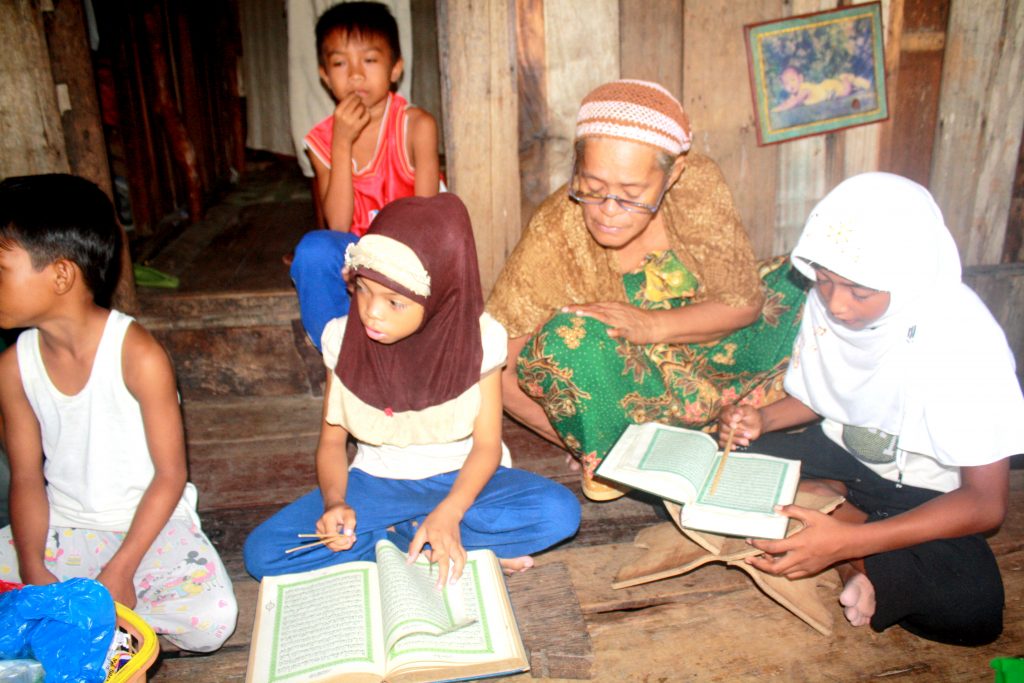 Inah Amina teaches children to read the Quran. Everyday girls and boys come to do “pangadji” or the reading of Quran, some of them to it in a singing manner and are very beautiful to listen to. Among those that come is “Edeng” another grandson of Inah Amina. Edeng comes to the house to check on me and join me on my walks together with the other children. Edeng is the son of Ka Badzair, who is the eldest brother of Ka Indah and the community leader of the island.
Inah Amina teaches children to read the Quran. Everyday girls and boys come to do “pangadji” or the reading of Quran, some of them to it in a singing manner and are very beautiful to listen to. Among those that come is “Edeng” another grandson of Inah Amina. Edeng comes to the house to check on me and join me on my walks together with the other children. Edeng is the son of Ka Badzair, who is the eldest brother of Ka Indah and the community leader of the island.
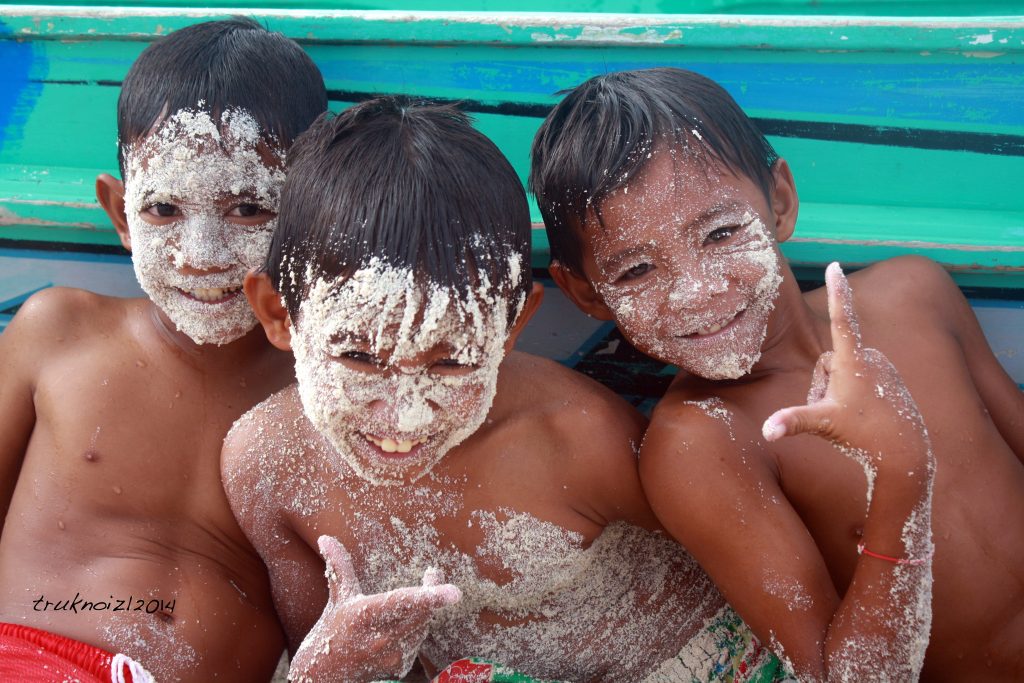 My encounter with Poyong the Little Prince, the family of Ka Indah and the entire community on the island helped me understand what dialogue is all about. I remember the conversation of the Little Prince and the Fox. The Little Prince asked the fox to play with him and the fox told him that the prince has to tame him first. Taming is according to the fox like establishing ties. Fr Michel de Girord used the story of the Little Prince to explain what dialogue is in his book “A Parable of Dialogue: The Little Prince Revisited”. Dialogue requires taming the other person. It means that like the fox we are all wild to one another – we unknown to each other, strangers and sometimes violent to each other. We must also allow ourselves to be tamed. I am like the fox to the people of the island. The island and the people have tamed me. I have been considered a friend and a family. Poyong, the Little Prince has tamed me. The fox told the little prince a secret: “It is only through the heart that one can see rightly what is essential is invisible to the eye.” May we begin to see the other through our hearts and not merely through our eyes!
My encounter with Poyong the Little Prince, the family of Ka Indah and the entire community on the island helped me understand what dialogue is all about. I remember the conversation of the Little Prince and the Fox. The Little Prince asked the fox to play with him and the fox told him that the prince has to tame him first. Taming is according to the fox like establishing ties. Fr Michel de Girord used the story of the Little Prince to explain what dialogue is in his book “A Parable of Dialogue: The Little Prince Revisited”. Dialogue requires taming the other person. It means that like the fox we are all wild to one another – we unknown to each other, strangers and sometimes violent to each other. We must also allow ourselves to be tamed. I am like the fox to the people of the island. The island and the people have tamed me. I have been considered a friend and a family. Poyong, the Little Prince has tamed me. The fox told the little prince a secret: “It is only through the heart that one can see rightly what is essential is invisible to the eye.” May we begin to see the other through our hearts and not merely through our eyes!
What I have learned about IRD from this, and other experiences?
Interreligious dialogue is about building relationships. It requires more than just understanding the other at the intellectual level like answering empirical questions. It is a lived experience – something one has to encounter, using all the senses.
Dialogue requires that one is not just interested to learn from them but to show genuine interest, how? studying their faith, attending their religious celebrations, asking real and not just for the sake of asking kind of questions. It must also go beyond intellectual inquiries but more into personal interaction later on. Dialogue is not imposing oneself on people but making oneself vulnerable and open to people. When we allow ourselves to be vulnerable and open, people will see we are sincere and not just patronizing them. Allowing ourselves to be tamed.
(L) At an Indian wedding in Fiji; (R) with Columbans in Yangon
On a personal level, IRD has allowed me to evangelize through dialogue of life. It has personally deepened my own faith and demands of me to understand, study and know more not just the other’s faith but also about my own self and faith. It also expanded my perspective about life and helped me in overcoming my introvertness by learning to reach out first and become more vulnerable and open to people. Lastly, I have found IRD is a great platform for other Society priorities like JPIC.

